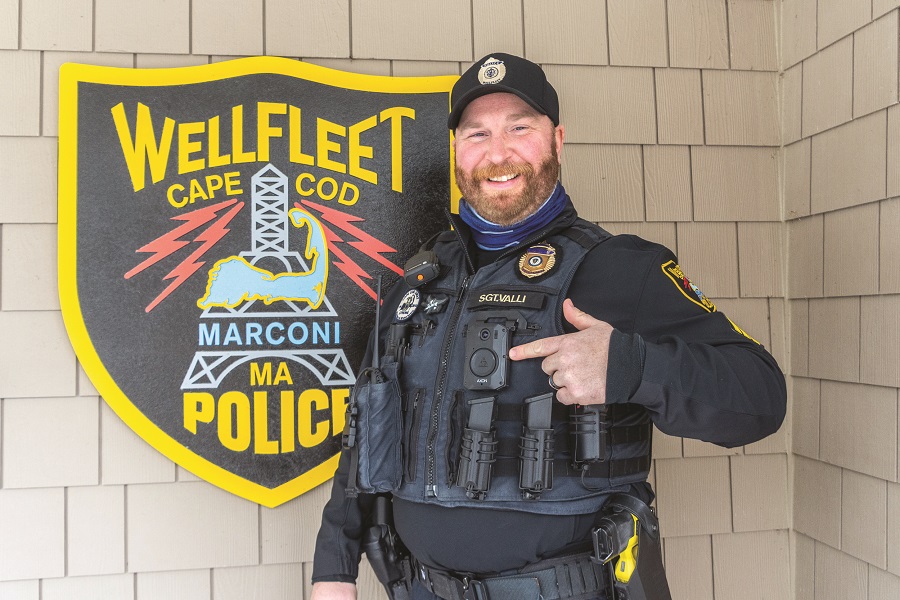WELLFLEET — The second smallest municipal police department on the Cape has become the first in the county to outfit all its officers with body cameras.
Wellfleet town meeting voters spent $30,000 last year to give all 15 police officers Axon body cameras. Maintenance, licensing, and storing of the video will cost $15,000 annually.
Currently, four officers have been trained to use them, but within a month all sworn officers on the force will be able to hook the cameras to their vests at the beginning of every shift.

Wellfleet’s policy, which could change as the department gains experience, is to record video and audio of every interaction the police have with the public. The officers must notify people that they are being recorded.
At first, it was proponents of the police reform movement who wanted the cameras as a tool to increase accountability, reduce police brutality, and root out bad behavior by rogue officers.
But officers who have used the technology for years, mostly in Southern and Western states like Florida, Arizona, Kansas, and California, have found that the video footage exonerates the police in the majority of cases, according to 2014 study by the U.S. Dept. of Justice.
Wellfleet Police Chief Mike Hurley expects the cameras to be a “win-win” for officers and the public. They will moderate the behavior of both, he believes.
Cameras can help “de-escalate” a confrontation, Hurley said. “Knowing that it is being documented does hold things back a little bit.”
Video footage will be used in court as evidence to document a scene. This can be important in cases lacking other witnesses or physical evidence, which can otherwise turn into a he-said-she-said argument in the courtroom.
“Video can be powerful,” Hurley said.
Only 10 percent of Massachusetts city and town police departments currently use the technology. But according to a poll by the Mass. Chiefs of Police Association, three-quarters of the police departments in major cities and smaller communities are interested in starting a camera program.
Gov. Charlie Baker is also a fan.
In July, his administration announced a new $20-million body camera grant program for municipal police departments. The state aims to give out 9,000 cameras over five years, according to the governor’s office.
The grant qualification, according to Baker’s announcement, includes a requirement to “describe a deliberate and phased plan to deploy the technology, as well as specific ways the proposed program will enhance the agency’s mission.”
Wellfleet is rolling out the cameras while still working out related policies. And cameras present some messy questions, such as how long to store the videos and how exactly they are released if there is a public records request. That gets complicated when minors or innocent parties are in the videos. Perhaps the trickiest question is what to do if a police officer does not turn on the camera.
For now, while Wellfleet officers get used to it, there will be no punishment for failing to press the “on” button, Hurley said, unless it becomes a pattern. The type of camera Wellfleet bought includes a powerful safety feature. When an officer pulls a Taser or gun from its holster, the Axon cameras will automatically turn on, said Officer Jeremiah Valli.
Allowing police discretion to turn on a camera or not could erode the public trust, according to the Mass. chapter of the American Civil Liberties Union. The ACLU has recommended that Massachusetts courts adopt a “no tape, no testimony” policy. That is, if an officer uses “bad faith” — which a jury would have to determine — by turning off the camera, the jury must disregard the officer’s testimony entirely.
Hurley said he is drafting department policies based on the ones used by the Mass. State Police, who started using them in December, and on the Mashpee Police Dept.’s pilot program. Both the Mashpee and the Yarmouth police are poised to bring body cameras to their departments this year, Hurley said.
Wellfleet’s final policy will come from the Mass. Commission on Police Body Cameras, he added. The 25-member commission, which includes representatives of law enforcement, legislators, and the NAACP, was supposed to have a policy draft by July 2021. Angela Davis, chair of the commission and state undersecretary of law enforcement and criminal justice, said it is now expected “early this year,” according to the Boston Herald.
Valli explained that the cameras are like mini-computers. They have multiple microphones that can focus on the human voice and minimize wind noise that ruins ordinary phone recordings. If the police radios fail, Valli said, and an officer cannot be reached by dispatch, the dispatchers will be able to livestream the officer’s location. This, however, depends on good cellular service, he added. Police frequently respond to fights at or outside the Beachcomber, which lies in a notorious radio dead zone at Cahoon Hollow Beach, Valli said.
Ryan Curley, the select board chair, said the Wellfleet police have had body cameras in the town’s capital budget for four years. He wanted it on the warrant as an override in 2021, but the rest of the board voted to put it directly into the police budget, which passed. Either way, Curley is happy they are here.
“I think it is necessary in this day and age,” he said. “My perspective is it is for police accountability.”
Editor’s note: An earlier version of this article, published in print on Jan. 27, omitted the fact that the Cape Cod National Seashore’s law enforcement park rangers have used body cameras since 2014. Thus, the headline “Wellfleet Cops First on Cape to Use Body Cameras” was not technically accurate.



